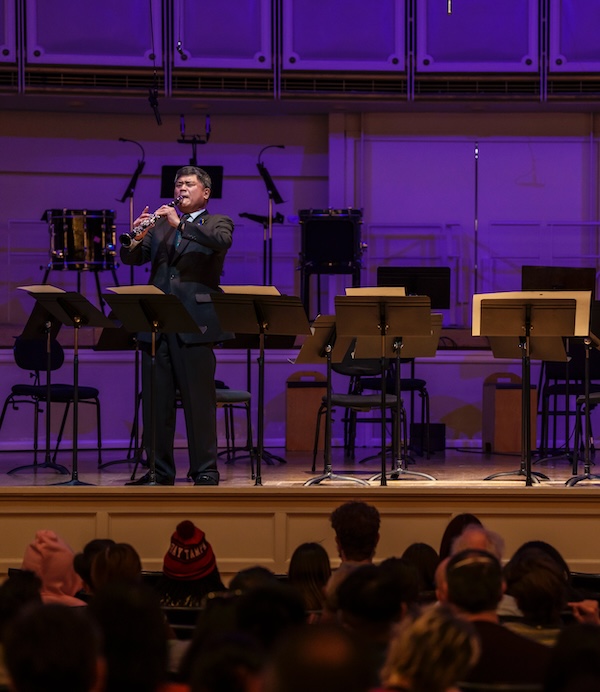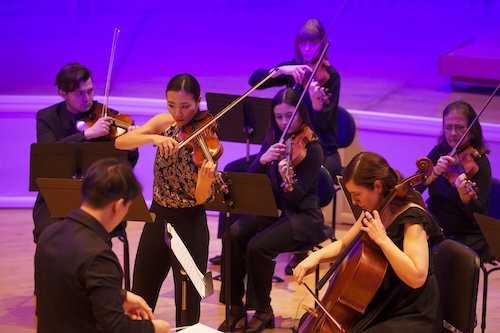Boulez centenary homage highlights CSO’s mixed MusicNOW program

The Chicago Symphony Orchestra’s MusicNOW contemporary music series wrapped up its oddly abbreviated season Sunday afternoon at Symphony Center with the second of two concerts performed by members of the CSO and guest musicians.
Jimmy López served as Mead composer-curator for the occasion, introducing to the series two of his own works in addition to other pieces of recent vintage by colleagues Quinn Mason and Adam Schoenberg, each of whom joined him on stage for a pre-concert conversation.
None of the newer works on the uneven program carried quite the impact of the program’s golden oldie (if the 1960s opus can be called that)—Pierre Boulez’s Domaines, performed by CSO assistant principal clarinet John Bruce Yeh in honor of the composer’s 100th birthday anniversary this Wednesday.
Boulez’s tenure as the CSO’s third principal guest conductor, which began in 1995 and lasted nearly until his death in 2016, marked a golden age for the orchestra and its audiences at home and abroad. It was a period of enlightened exploration into new music and key classics of the 20th century, led by one of the foremost minds and most eloquent interpreters of musical modernism. Chicago, one is confident in assuming, won’t experience its like again.
Domaines exists in twoversions, of which Yeh played the first (1961-68), for clarinet solo. The landmark score has the clarinetist moving from music stands spread in a semicircle across the stage, each of the six bearing a “notebook” of pointillist sounds and gestures, with discrete “cells” mirroring each cahier. The music expands the expressive possibilities of the clarinet in all sorts of fascinating ways, using chains of trills, multiphonics, flutter-tonguing, trills and other extended techniques to create a kind of loose, literally mobile narrative made up of both written and chance elements. Domaines is at once rigorous and puckish, its originality undeniable after nearly six decades.
None but the most virtuosic of soloists need apply, and Yeh, who with Chicago composer Howard Sandroff gave the first U.S. performance of the computerized realization of Boulez’s Dialogue du ombre double (1985), made its rough places feel wondrously plain in his commanding performance.
The strongest of the two López works, his 2016-17 Guardian of the Horizon, reinterprets the baroque concerto grosso of Handel and others as an intense, jumpy yet sometimes tenderly lyrical dialogue in three movements between solo violin and cello and string ensemble. Sometimes, as in the twittering-machine opening movement, the exchanges between soli and tutti forces are playful; sometimes, as in the finale, they explode into flurries of sonorous competition.
If the writing isn’t quite as compelling as earlier López pieces heard locally, including his orchestral tone poem Aino and opera Bel Canto, the composer’s keen ear for orchestration and dynamic interlacing of individual and group voices cannot be denied. The performance by CSO associate concertmaster Stephanie Jeong and cellist Karen Basrak with a 14-member string group efficiently led by Nicholas Koo, was everything a composer could want.

As dour and brooding as Guardian of the Horizon was airy and playful, Lopez’s La Caresse du Couteau (2004) was inspired by a graphic that can be traced back to ancient Greek and Sufi spiritual traditions. The string quartet, cast in six connected parts, explores a kaleidoscope of varied textures and colors, with shifting tonal and atonal harmonies, furtive pizzicatos and siren-like glissandos lending a sense of inner struggle, striving to the light. Despite a capable reading, the music left a curiously anodyne impression.
The most conservative piece on the program was Schoenberg’s Reflecting Light, written as a kind of conversational ode for his teacher on the death of the latter’s father. The music follows a formally satisfying trajectory from the slow, chorale-like opening pages to sustained ostinatos and an affirmative close harkening back to the chorale. Skillfully wrought and well played, the lyrical piece fell agreeably on the ear without having to resort to the cliches of contemporary brass-quintet writing.
Completing the program was Mason’s Weapon Wheel, a brief, pounding, rhythmic romp for three bass drums that neatly manages to transcend the expressive limitations of the unpitched instruments. (“Insane” is one of the markings in the score.) It was done with irresistible, exuberant flourish by percussionists Patricia Dash, Douglas Waddell and Ian Ding.
Posted in Uncategorized

